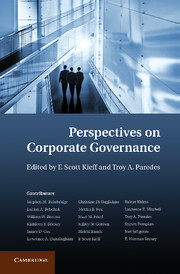Book contents
- Frontmatter
- Contents
- Contributors
- Acknowledgments and Dedication
- PERSPECTIVES ON CORPORATE GOVERNANCE
- Introduction
- PART ONE THE BOARD OF DIRECTORS AND THE CEO
- 1 The Trouble with Boards
- 2 Rediscovering Board Expertise: Legal Implications of the Empirical Literature
- 3 The CEO and the Board: On CEO Overconfidence and Institutionalizing Dissent in Firms
- PART TWO THE WHY, WHEN, HOW, AND HOW MUCH OF EXECUTIVE PAY
- PART THREE CONSTRAINING MANAGERS AND DIRECTORS: INVESTORS, SECURITIES REGULATION, AND THE MEDIA
- PART FOUR DELAWARE VERSUS CONGRESS: ON THE FEDERALIZATION OF CORPORATE GOVERNANCE
- PART FIVE COMPARATIVE CORPORATE GOVERNANCE
- Epilogue: Three Secular Trends of Corporate Law
- Index
- References
2 - Rediscovering Board Expertise: Legal Implications of the Empirical Literature
Published online by Cambridge University Press: 04 August 2010
- Frontmatter
- Contents
- Contributors
- Acknowledgments and Dedication
- PERSPECTIVES ON CORPORATE GOVERNANCE
- Introduction
- PART ONE THE BOARD OF DIRECTORS AND THE CEO
- 1 The Trouble with Boards
- 2 Rediscovering Board Expertise: Legal Implications of the Empirical Literature
- 3 The CEO and the Board: On CEO Overconfidence and Institutionalizing Dissent in Firms
- PART TWO THE WHY, WHEN, HOW, AND HOW MUCH OF EXECUTIVE PAY
- PART THREE CONSTRAINING MANAGERS AND DIRECTORS: INVESTORS, SECURITIES REGULATION, AND THE MEDIA
- PART FOUR DELAWARE VERSUS CONGRESS: ON THE FEDERALIZATION OF CORPORATE GOVERNANCE
- PART FIVE COMPARATIVE CORPORATE GOVERNANCE
- Epilogue: Three Secular Trends of Corporate Law
- Index
- References
Summary
People are rediscovering the value of expertise on corporate boards of directors. The rediscovery occurs after several decades of celebrating independent directors under the guise of the monitoring model of boards. While independence remains fashionable, and the Sarbanes-Oxley Act of 2002 (SOX) continues its long-standing promotion, SOX also requires companies to disclose whether their boards have expertise on the board audit committee and, if not, why not. This hastens an inchoate ten-year trend favoring expertise. The value of expertise is supported by theory and empirical research. Accidents of political history appear to explain its subordination, until recently, to independence.
As a matter of theory, board expertise harmonizes with basic division of labor principles, yet little attention is paid to the specific expertise that directors offer. The most prominent model of director expertise, developed during the rise of the monitoring board, envisioned an expertise in “decision control.” But this views boards as monoliths and hides the significance of individuals in group decision making. Accompanying the rise of the monitoring board and its privileged place for independence was the rise of the board committee, especially the audit committee. Although committees have designated functions, until recently, the focus has been on member independence rather than expertise benefiting from division of labor.
As an empirical matter, the value of expertise is supported by a large body of research. Most strikingly, research shows that accounting expertise is valuable in promoting audit committee effectiveness, while general financial and other expertise contribute less value.
- Type
- Chapter
- Information
- Perspectives on Corporate Governance , pp. 62 - 95Publisher: Cambridge University PressPrint publication year: 2010
References
- 1
- Cited by



